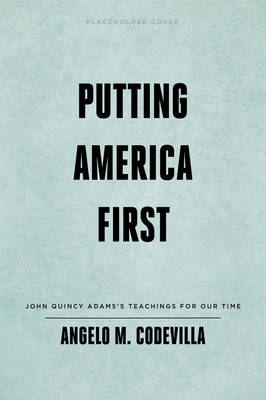
- Afhalen na 1 uur in een winkel met voorraad
- Gratis thuislevering in België vanaf € 30
- Ruim aanbod met 7 miljoen producten
- Afhalen na 1 uur in een winkel met voorraad
- Gratis thuislevering in België vanaf € 30
- Ruim aanbod met 7 miljoen producten
Zoeken
Putting America First
John Quincy Adams's Teachings for Our Time
Angelo M Codevilla
Hardcover | Engels
€ 34,95
+ 69 punten
Omschrijving
Describing the United States' relations with other nations as "America First" would have made no sense to presidents between George Washington and Theodore Roosevelt. They, committed to pursuing what Washington called "our interest guided by justice" and acting as the American people's fiduciary representatives, would not have considered any other priority. But the Progressive movement that won over American elites a hundred years ago premised precisely that U.S policy must concern itself primarily with mankind as a whole, with America only derivatively, and with values that transcend the American people. Hence, Progressives use the term "America First" to accuse other Americans of neglect of duty, stupidity, etc. But "America First," namely pursuing what benefits our American character and advances our legitimate interests, and regarding all foreign relations from that perspective--in short, fully minding our business while leaving other peoples to mind theirs--was the basis of the United States' successful foreign policy circa 1815-1910. Best described by John Quincy Adams and carried out by his successors, this is the foreign policy by which America grew great in peace. It remains the American people's common sense. This study contrasts this original "America First" foreign policy with the basis and results of the subsequent century's Progressive policy. It shows the transformation of a culture of peace and victory into that of statesmen who eliminate the very concepts of victory and peace from the military's official vocabulary as they manage endless wars. Then, the book examines how J.Q. Adams's insights are applicable to the current domestic and international environment--what "America First" can mean in our time.
Specificaties
Betrokkenen
- Auteur(s):
- Uitgeverij:
Inhoud
- Aantal bladzijden:
- 350
- Taal:
- Engels
Eigenschappen
- Productcode (EAN):
- 9781645720249
- Verschijningsdatum:
- 14/09/2021
- Uitvoering:
- Hardcover
- Formaat:
- Genaaid
- Afmetingen:
- 152 mm x 229 mm

Alleen bij Standaard Boekhandel
+ 69 punten op je klantenkaart van Standaard Boekhandel
Beoordelingen
We publiceren alleen reviews die voldoen aan de voorwaarden voor reviews. Bekijk onze voorwaarden voor reviews.








